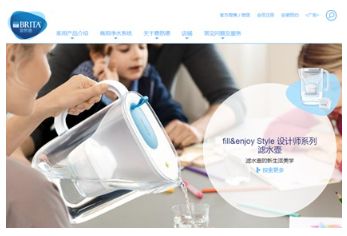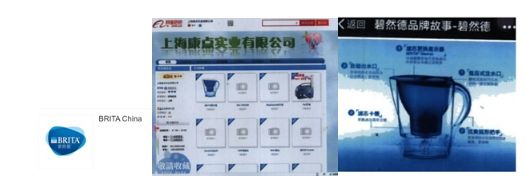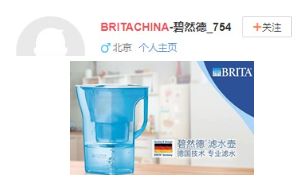While toilet paper sold out in the U.S., water filters got hot in China during the pandemic. A Chinese company decided to rip off the famous water filter brand, Brita®, by selling pitchers and filters on Alibaba websites and Chinese social media accounts under the marks "BritaChina" "EUBrita" and "碧然德 (i.e., Brita in Chinese characters)":

(Genuine Brita® Products)
v.

(Infringing Products)
The good news is that Shanghai Intellectual Property Court handed down Brita GmbH its well-deserved victory without hesitation. The Court found that the defendant seller, Shanghai Health Point Industries Co., Ltd. ("Health Point"), intentionally infringed upon Brita GmbH's prior, well-known trademarks and trade name BRITA in English and BRITA in Chinese characters in connection with pitchers and filters, (1) issued a permanent injunction against Health Point's use of Brita GmbH's marks and names; (2) awarded Brita GmbH $350,000 in U.S. dollars for damages plus $70,000 for attorney fees and costs; (3) ordered Health Point to apologize to Brita GmbH for its infringement activities on front pages of major Chinese newspaper for 3 consecutive days; and (3) ordered seller accounts "BritaChina" and "EUBrita" be permanently deleted (and never become available for usage again) across Alibaba websites and Tencent's WeChat mobile application.
Brita GmbH earned its victory by diligently filing for its English mark (BRITA) over fifteen (15) years before it sold the first pitcher in China in 2008. Shortly before 2008, Brita GmbH also applied for its Chinese equivalent mark碧德然; the applications matured into registration in 2009. Brita GmbH has consistently used these marks to sell and promote its products in China for the last thirteen (13) years.
Health Point, on the other hand, was incorporated in 2010 with a scope of business ranging from baby bottles, medical devices, to agricultural byproducts. Health Point set up shops on 1688.com, a popular e-commerce website owned by Alibaba, and on popular social medial handles including on the WeChat mobile application under seller names of "BritaChina" and "EUBrita."
Brita GmbH swiftly submitted take-down notices to Alibaba and Tencent (which owns the WeChat application) based on grounds of counterfeiting and false advertising. Alibaba suspended and Tencent disabled these accounts across their platforms.
However, Health Point did not cease infringement. Rather, it acquired new seller accounts on Alibaba and Tencent platforms, using Brita's Chinese character mark as its account name and the BRITA Logo as its profile picture:

Brita had enough. It promptly notarized Health Point's infringing activities on the Internet, preserved its own evidentiary documents to show fame of the BRITA name and marks in China, and filed the complaint against Health Point for trademark infringement and unfair competition in Shanghai. In the court action, Brita GmbH continued to do a great job at proving that its marks have been in use, become famous in China, and Brita GmbH be entitled to increased damages and attorney fees for the willful infringement.
Brita GmbH submitted forty-two (42) evidentiary documents, including notarized screenshots of Health Point's infringing product listings, Brita GmbH's take-down notices and e-commerce platforms' decisions, invalidation decisions by the Chinese Trademark Review and Appeal Board of Health Point's bad faith filings for BRITA- variation marks in English and Chinese, Brita's own Declarations relating to the use and promotion of the BRITA- marks in China, registration and renewal certificates, sales invoices and distribution agreements, awards, and attorney invoices.
Health Point argued that it did not have bad faith or intent to infringe upon Brita GmbH's name and marks. Instead, Health Point claimed that it was a legit reseller of genuine Brita-branded products and entitled to use the BRITA marks for the resale. The court found these arguments unpersuasive, noting that the repeated infringement using -BRITA variation marks and Health Point's false advertisements that it was somehow authorized by Brita GmbH to resell Brita-branded products in China clearly demonstrated its intent to trade off the goodwill of Brita GmbH. The court found Health Point's activities to be exceptionally "deceiving" and "breaching the moral bottom line"1 of the Chinese trademark law.
The take-aways of this "feel-good" case are that:
- It is not only important to monitor trademark filings at the Chinese Trademark Office, but also critical to look out for unauthorized uses of your mark and name on popular Chinese e-commerce websites and social media platforms.
-
Registering early, using the registered mark, and preserving documents relevant to your Chinese brand is critical for enforcement purposes in China.
-
When the "Whac-A-Mole" game on e-commerce and social media platforms gets tiring and ineffective, remember to preserve favorable take-down decisions to use in a court action to show intent to infringe.
This case is Brita GmbH and Brita Water Filtration Systems (Shanghai) Co., Ltd. v. Shanghai Health Point Industries, Ltd., Case Number 2017)沪0112民初26614号.
Footnote
1See Shanghai Court's press release on this case: http://www.hshfy.sh.cn/shfy/web/xxnr.jsp?pa=aaWQ9MjAyMTc0ODgmeGg9MSZsbWRtPWxtNTE5z.
The content of this article is intended to provide a general guide to the subject matter. Specialist advice should be sought about your specific circumstances.
Alvin Xu
Finnegan, Henderson, Farabow, Garrett & Dunner, LLP
901 New York Avenue, NW
Washington, DC
20001-4413
UNITED STATES
Tel: 2024084000
Fax: 2024084400
E-mail: info@finnegan.com
URL: www.finnegan.com
© Mondaq Ltd, 2021 - Tel. +44 (0)20 8544 8300 - http://www.mondaq.com, source Business Briefing





